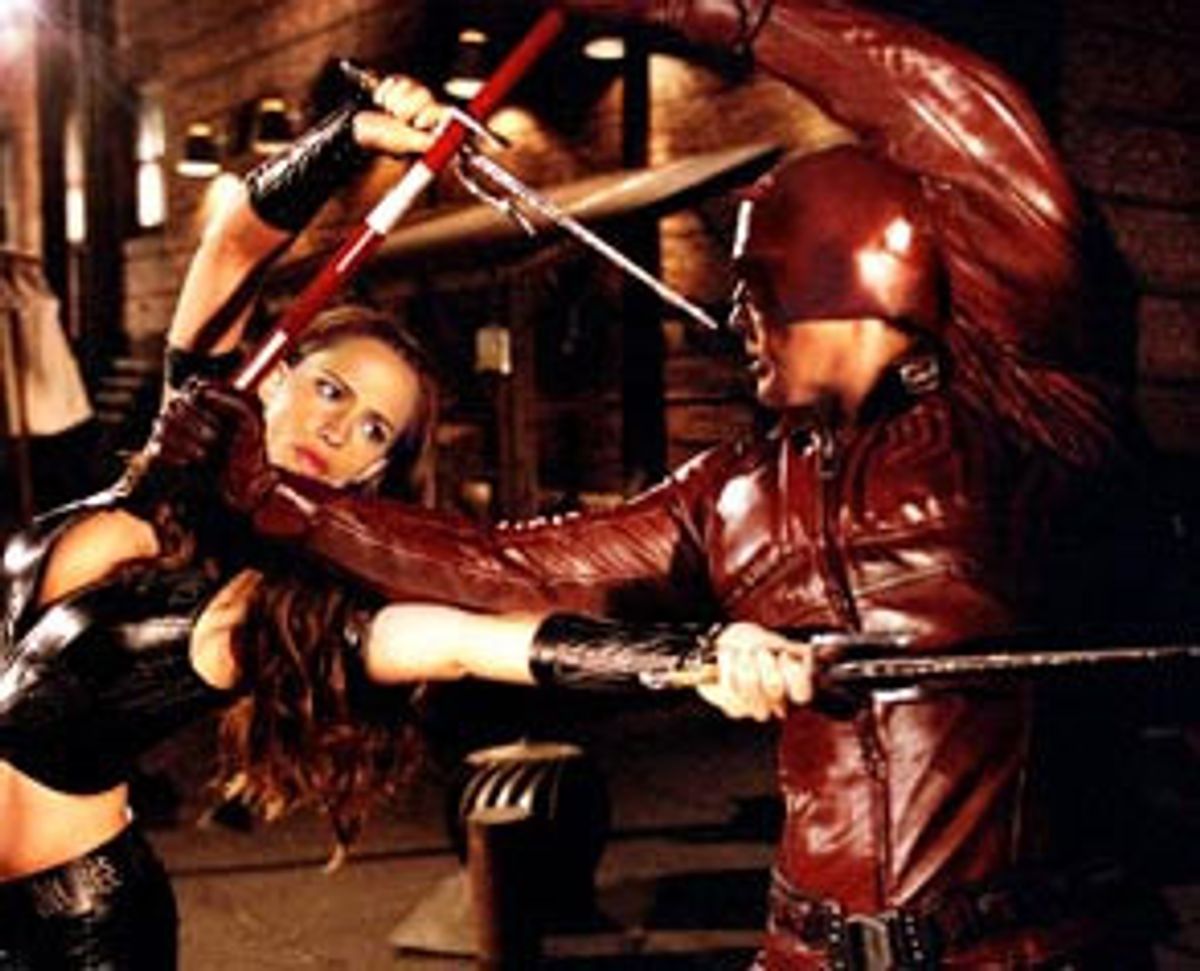Almost every comic-book superhero, no matter how convoluted and lame his back story may be, is bound for the big screen. This is not really a problem. Comic books traffic in exactly the kind of stark moral dramas and unjaded boyish enthusiasm at which Hollywood spectacles excel; it's a natural fit. If anything, the comics medium is more serious about matters of life and death, more philosophically and socially engaged, than most of the crappy movies-by-committee cranked out by American studios.
For all the star power and alleged sex appeal of its leading couple, however, the silver-screen debut of Marvel Comics' Daredevil is exactly the kind of middling, watchable, semiboring action movie that's likely to turn the public away from guys in Spandex with finely honed super-tingly-radioactive-sonar powers. I don't mean to disrespect Daredevil's many loyal fans here. But let's face it: Despite his blindness, he has always been the other New York regular-guy Marvel superhero in a red suit, and this flick (adapted by director Mark Steven Johnson from the characters created by Bill Everett, Stan Lee and Frank Miller) doesn't do much to close the Spidey gap.
Johnson's "Daredevil" is often strikingly pretty, in an abstract, drifty, almost sculptural way. We see Ben Affleck, in his beefiest, most impassive mode, brooding above the synthetic Manhattan nightscape like an architectural gargoyle, albeit one clad in a maroon leatherette suit that looks like it was made out of the couch my divorced dad had in his suburban apartment, circa 1977. Affleck and "Alias" star Jennifer Garner don't generate much heat in their scenes together -- they seem more like chums or virginal grade-school sweethearts than lovers. But they're such extraordinary physical specimens it's an undeniable pleasure to watch them suck face in the rain or pound each other senseless. Garner is all unlikely sharp angles and spectacular cheekbones, while there's something curvaceous, almost androgynous, about Affleck's helium-charged pecs and shoulders.
Presumably, however, Johnson and his collaborators are not pursuing some mock-Warhol vision of avant-garde, celebrity-fueled emptiness. There are efforts to tell a story in "Daredevil," but they're pretty clueless, as if the filmmakers were only remotely familiar with the standard techniques of either comic books or movies. Terrible things befall Daredevil, largely as a result of his own freelance vigilante crime-fighting. But the movie seems oblivious, sticking to its rhythm of strike-a-pose moments interspersed with murky digital effects and Hong Kong-style fight sequences, all edited into a brain-melting blur and set to an assortment of nu-metal and hip-hop singles.
"Daredevil" begins agreeably enough, with the obligatory origin myth explaining how young Matt Murdock (played as a kid by Scott Terra), growing up in Manhattan's Hell's Kitchen, is blinded in a freak accident involving nuclear waste. (That stuff was all over the streets of New York in the '80s, apparently.) The toxic goo leaves Matt's other four senses ultraheightened, so he can use a kind of sonar-radar technique -- an especially splashy visual effect -- to "see" the people and places around him. After his ex-boxer hoodlum dad (David Keith) gets bumped off for trying to go straight, Matt realizes he must devote his life to kicking the asses of white dudes with dubious facial hair wearing knit caps and work jeans. (This is one of those movies where the bad guys look like the outfoxed intruders in a burglar-alarm commercial.)
When we fast-forward to this movie's version of New York in the present (mostly shot on a Los Angeles soundstage; at least it's not Toronto), "Daredevil" begins to spin its wheels in the narrative mud. Matt is a stylin' blind lawyer by day ("It's not right -- another rapist back on the street"), maroon-couch-leatherette-wearing vigilante by night (the rapist gets his, along with an entire barroom full of those burglar-alarm white guys). He meets Elektra (Garner), who is both a hottie and a zillionaire's daughter, after, well, smelling her across a crowded coffee shop. If that's not icky enough, he stalks her to a nearby playground, where they proceed, apropos of nothing, to kung-fu each other half to death. Young love.
The future Mr. J.Lo has never been the most expressive actor around, and between the couch-suit and the script's dopey imitations of comic-book monologue ("Can one man make a difference? There are days when I believe and others when I have lost all faith"), neither Matt nor his alter ego has much of a personality. Daredevil is supposedly pursuing a crime lord called the Kingpin (Michael Clarke Duncan) and as the movie pokes along he sure accumulates lots of reasons to bring him down, but Matt seems more depressed and gloomy than angry or passionate.
Duncan is an imposing physical presence, as always, but he's not a strong enough actor to turn his underwritten role into a compelling villain. Sometimes he seems like a cuddly George Foreman type and sometimes he seems to be auditioning for the role of Stanley Kowalski in a community-theater "Streetcar Named Desire." Good money was spent hiring the likes of Jon Favreau and Joe Pantoliano to kill time around the fringes of this film, but the only performance I really enjoyed was that of Colin Farrell, as a leather-clad, dart-throwing Irish psychopath named Bullseye.
Alone among the cast, Farrell seems to understand that this movie -- which is lazy and stoned, for all its loud music -- needed somebody to go ape-shit, to pretend to give a crap or at least to have fun. I wouldn't bet the ranch, or even the ranch dressing, on a sequel to "Daredevil." But if they make one, they've got to lose the bummed-out dude in the Naugahyde costume and stick with this guy. Nobody wants a hero whose defining quality is that he's not Spider-Man.



Shares